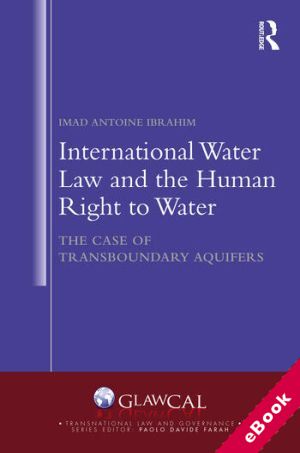
The device(s) you use to access the eBook content must be authorized with an Adobe ID before you download the product otherwise it will fail to register correctly.
For further information see https://www.wildy.com/ebook-formats
Once the order is confirmed an automated e-mail will be sent to you to allow you to download the eBook.
All eBooks are supplied firm sale and cannot be returned. If you believe there is a fault with your eBook then contact us on ebooks@wildy.com and we will help in resolving the issue. This does not affect your statutory rights.
This book examines the development of international law applicable to Transboundary Aquifers (TBAs) considering the Human Right to Water and Sanitation (HRWS). The purpose is to determine how International Water Law (IWL) and the HRWS can be harmonized in the context of TBAs. This is important given rules and instruments adopted to address this topic are relatively nascent, and the field itself is still in the process of developing regulatory frameworks.
Taking the application of the HRWS to shared aquifers as a case study, the work discusses whether IWL and International Human Rights Law complement each other. The response to this question requires an analysis of the development of International Groundwater Law (IGL) and its challenges, the evolution of the HRWS, the nature of transboundary groundwaters, and the interplay between these two fields. The study argues that IWL agreements should contain a provision related to the HRWS to ensure the protection of this right with a stipulation included in the nonbinding instrument that tackles shared groundwaters: the Draft Articles on the Law of Transboundary Aquifers adopted in 2008 through the United Nations General Assembly (UNGA) Resolution.
The book will be of interest to international lawyers, water and human right experts, geologists and anyone interested in water and human rights issues.